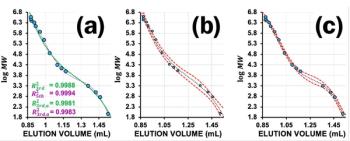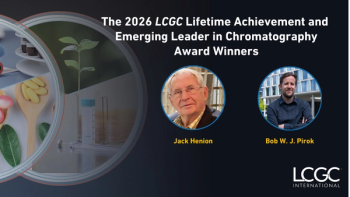
LCGC Announces the 2022 Winners of the Lifetime Achievement and Emerging Leader in Chromatography Awards
LCGC, the leading resource for separation scientists, is proud to announce that Barry L. Karger and James P. Grinias are the winners of the 15th annual LCGC Lifetime Achievement and Emerging Leader in Chromatography Awards, respectively.
LCGC Announces the 2022 Winners of the Lifetime Achievement and Emerging Leader in Chromatography Awards
LCGC, the leading resource for separation scientists, is proud to announce that Barry L. Karger and James P. Grinias are the winners of the 15th annual LCGC Lifetime Achievement and Emerging Leader in Chromatography Awards, respectively. Karger and Grinias will be honored in a symposium as part of the technical program at the Pittcon 2022 conference in March 2022.
The Lifetime Achievement Award
The Lifetime Achievement in Chromatography Award honors an outstanding professional for a lifetime of contributions to the advancement of chromatographic techniques and applications.
Karger, the 2022 winner, is the Director Emeritus of the Barnett Institute and the James L. Waters Emeritus Chair and Distinguished Professor Emeritus at Northeastern University, in Boston, Massachusetts. He is best known for his work developing liquid chromatography (LC), capillary electrophoresis (CE), and mass spectrometry techniques and using them to advance bioanalysis, peptide and protein separations, proteomics and metabolomics studies, and biopharmaceutical studies.
Karger began his career in gas chromatography (GC) in the 1960s, but with the advent of LC in the late 1960s, he quickly became one of the early leading figures in that field. Along with Csaba Horváth, Karger was one of the first to develop reversed-phase LC (RPLC), now the predominant LC mode.
In the 1980s, Karger focused on peptide and intact protein separation. He was active in the development of peptide mapping by RPLC for characterization of proteins, an essential tool at that time for the emerging field of biotechnology. His research also led to an understanding of the effect of native-denatured changes of proteins on chromatography. He also introduced hydrophobic interaction chromatography (HIC) using small-particle columns for separation of native protein species.
In the late 1980s and 1990s, Karger became a leader in capillary electrophoresis (CE). His studies led to the first demonstration of replaceable linear polymer matrices, a key advance in automating DNA sequencing. His linear polyacrylamide matrix was used to sequence more than 40% of the human genome in 2001.
In the new millennium, his focus shifted to LC– and CE-MS, especially the integration of separation and MS for proteomics and protein analysis. He recognized at an early stage the importance of low flow-rates for achieving high sensitivity in electrospray ionization (ESI)-MS. He devoted a significant effort to develop narrow bore LC columns for on-line MS coupling. He applied the columns he developed to the analysis of very limited amounts of clinical samples, and his work led to significant advances in the identification of biomarkers, such as for breast cancer.
Karger has also been a leader in protein biopharmaceutical characterization. His group, using LC–MS, was able to elucidate the disulfide linkages in a protein with a complicated cysteine knot where a total of 15 possibilities existed. As another example, his group characterized beta-interferon using CE-MS. Achieving over 400,000 theoretical plates, a total of 138 different modifications were found in the analysis of the intact protein.
Karger is the author of 375 publications, with an h index of 98, plus 50 patents, as well as ~500 oral and poster presentations at conferences, including ~50 plenary lectures. He trained more than 200 PhD students, post-doctoral researchers, and staff scientists, many of whom went on to distinguished careers in separation science.
Over his career, Karger has received numerous awards. Highlights include the Dal Nogare Memorial Award (1975), the American Chemical Society Award in Chromatography (1982), the M.S. Tswett Medal in Chromatography (1986), the A.J.P. Martin Medal from Chromatographic Society of the United Kingdom (1991), the Eastern Analytical Symposium (EAS) Award for Outstanding Achievements in the Field of Separations Science (1997), the ACS Award in Separations Science and Technology (1998), the. Halász Medal of the Hungarian Chemical Society for Chromatography and Separation Science (2002), the CaSSS Award for Distinguished Contributions to Separation Science (2003), elected an external member of the Hungarian Academy of Science (2007), the Michael Widmer Award (2004), the Torbern Bergman Medal from the Analytical Division of the Swedish Chemical Society (2008), the Csaba Horváth Medal Award of the Connecticut Separation Science Council (2008), the Golay Medal (2009), the Csaba Horváth Lectureship from the Hungarian Chapter of the American Chemical Society (2010), the J. Heyrovsky Honorary Medal for Merit in the Clinical Sciences from the Academy of Sciences of the Czech Republic (2010), and the Arnold O. Beckman Medal (April 2014).
The Emerging Leader Award
The Emerging Leader in Chromatography Award recognizes the achievements and aspirations of a talented young separation scientist who has made strides early in his or her career toward the advancement of chromatographic techniques and applications.
Grinias, the 2022 winner, received his PhD in chemistry in 2014 at the University of North Carolina at Chapel Hill, under the advisement of Jim Jorgenson. He is currently an associate professor of chemistry at Rowan University, in Glassboro, New Jersey.
At Rowan, Grinias carries on a research program with undergraduate and M.S. students. There, he has published papers in diverse areas, such as instrument design and miniaturization, superficially porous particles (SPP), and fast liquid chromatography.
In his work on miniaturization of analytical separation instrumentation, Grinias and his group have focused on better understanding the nature of band broadening in extremely low-volume systems, especially related to sample injection and tubing connections. The project had led to collaboration with Axcend Corp. on the development of a new portable LC instrument for point-of-care monitoring and pharmaceutical analysis. He has also worked to advance the development of packed beds for capillary and glass chip microfluidic devices. The group focuses on low-cost fabrication and new detection schemes for biomedical and environmental applications using these miniaturized systems, including a new 3D-printed pump system for droplet microfluidics.
Grinias is currently working on projects that are providing applications to the biological, clinical, and forensic markets. His work on portable LC involves the easy and effective screening of illicit drugs from urine in clinical settings and on-line reaction monitoring in the pharmaceutical industry. For metabolic studies, coupling of 2D separation techniques (ion exchange and supercritical fluid chromatography) is a first and the separation and detection of derivatized organic acids is being investigated on this sophisticated system. He is further expanding this work into the area of 2D-LC with studies focused on parallel arrays of capillary LC columns in the second dimension.
In addition, despite just beginning his scientific career, Grinias regularly gives back to the community. He serves on the organizing committees for the HPLC and ISCC symposia series when the meetings are held in the United States. He has served as the program chair and president of the Chromatography Forum of Delaware Valley, and as secretary and chair-elect of the American Chemical Society (ACS) Subdivision of Chromatography and Separations Chemistry. He is also a reviewer for and a member of the editorial advisory boards of several analytical chemistry journals.
To date, Grinias has 32 publications and has given more than 80 oral and poster presentations. He has also received several awards, including the ACS Satinder Ahuja Young Investigator in Separation Science Award (2021), a National Science Foundation (NSF) CAREER Award (2021), the Chinese American Chromatography Association Young Investigator Award (2020), an NIH National Research Service Award (NRSA) Postdoctoral Fellowship (2015), the Shimadzu ISCC 2014 Best Poster Award (2014), the HPLC 2013 Csaba Horváth Top Young Scientist Award (2013), an NSF Graduate Research Fellowship (2010), an NSF Research Experiences for Undergraduates (REU) Fellowship (2007), and the ACS Analytical Chemistry Award at Eastern Michigan University (2006).
Visit the LCGC website or information about
Newsletter
Join the global community of analytical scientists who trust LCGC for insights on the latest techniques, trends, and expert solutions in chromatography.




